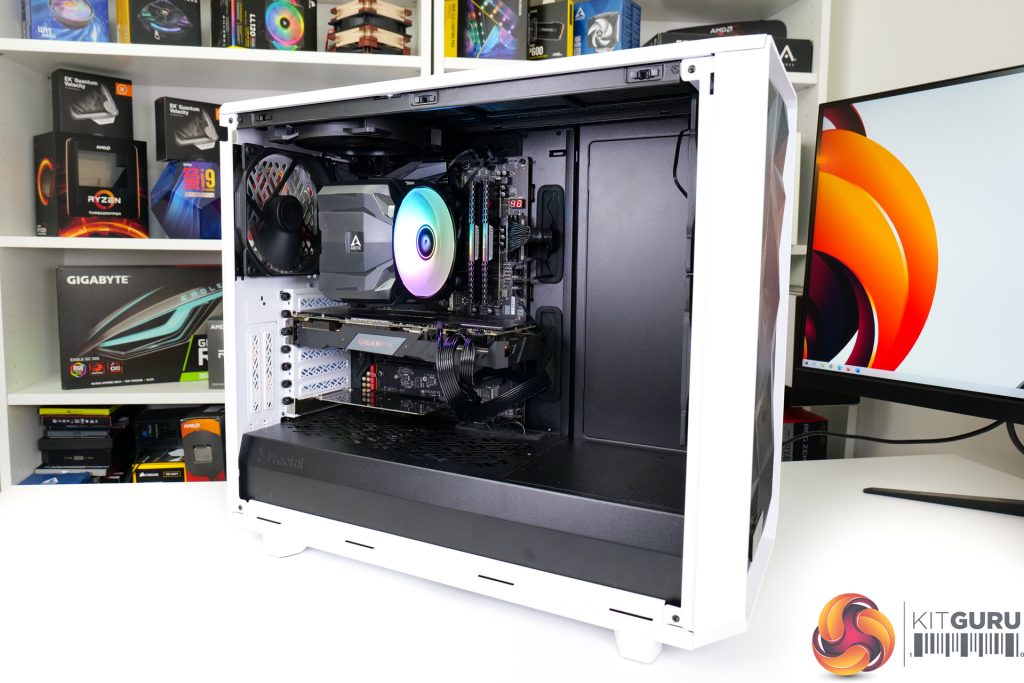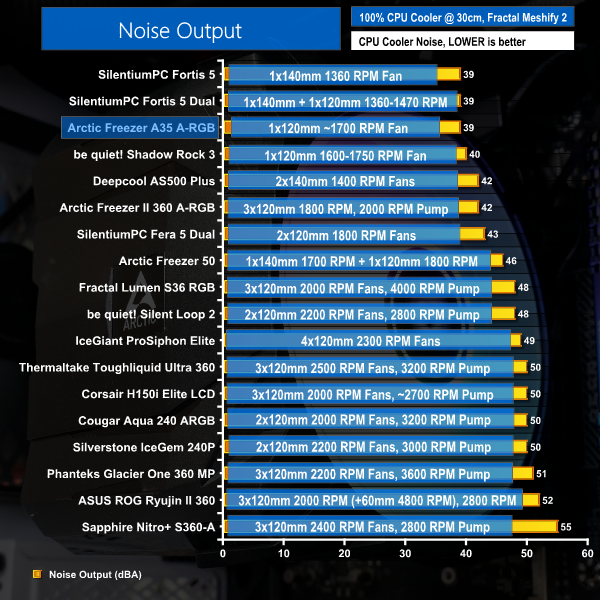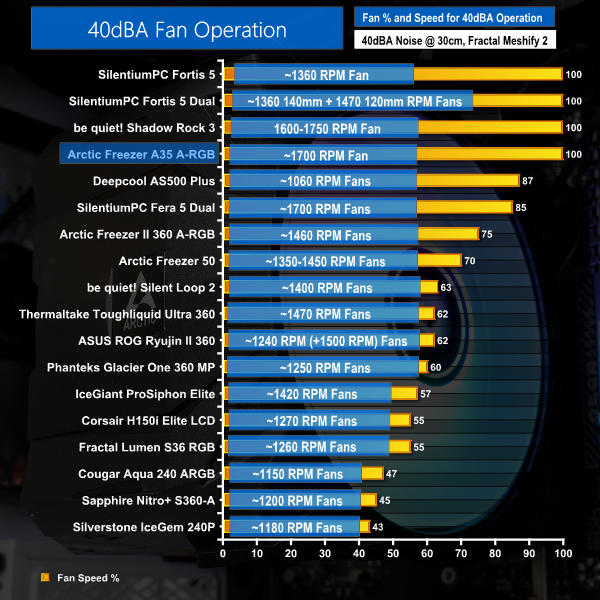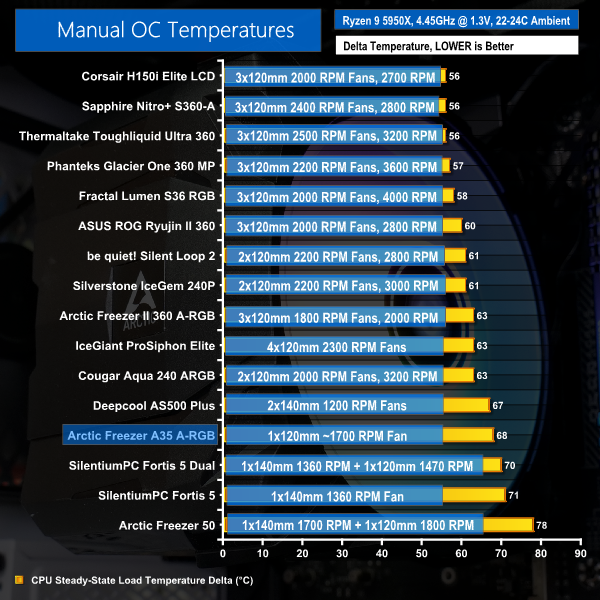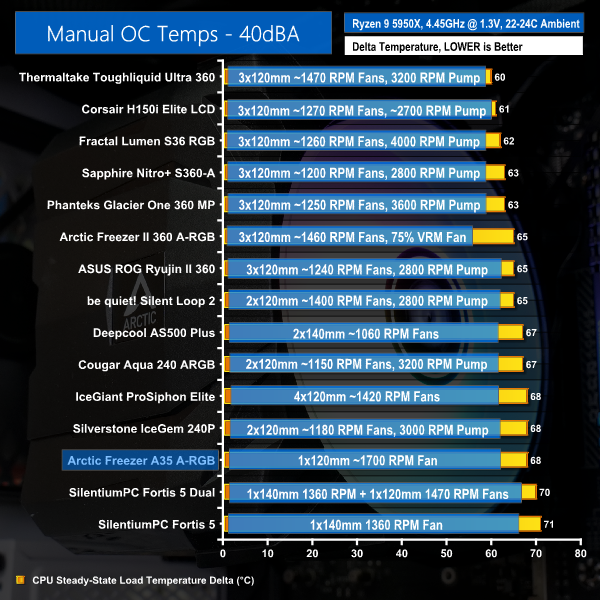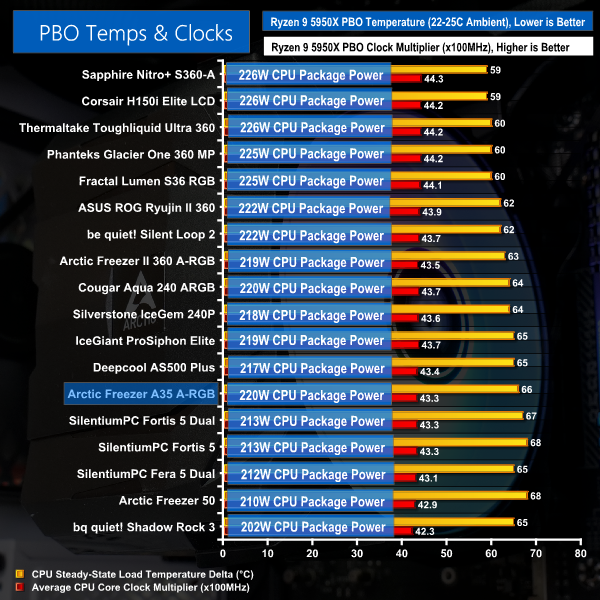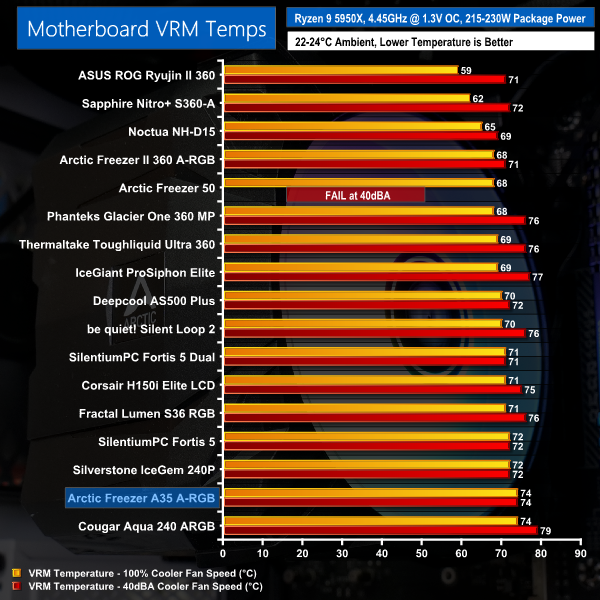Test System:
- Processor: AMD Ryzen 9 5950X
- Overclocked Settings: 4.45GHz all-core @ 1.312V (UEFI), Medium LLC – around 1.3V delivered
- Motherboard: Gigabyte B550 Aorus Master
- Memory: 32GB (2x16GB) Corsair Vengeance LPX 3600MHz 16-18-18-36 DDR4 @ 1.35V
- Graphics Card: Gigabyte RTX 2060 Super 0dB Mode
- Chassis: Fractal Design Meshify 2
- Chassis Fans: 2x140mm 1000 RPM Fractal Front Intake, 1x140mm 1000 RPM Fractal Rear Exhaust, 1x140mm 1000 RPM be quiet! Pure Wings 2 Roof Exhaust (for air cooler testing)
- Power Supply: Seasonic Prime TX-1000
- Operating System: Windows 10 Pro 64-bit
Testing Methodology:
- For testing, we use a 30-minute looped run of Cinebench R23 and record the steady-state CPU temperature at the end of the test. This ensures that the CPU has had ample time to warm up and reach steady state under all of the coolers.
- Ambient is maintained around 22-24 degrees Celsius. Where there is variation beyond this temperature range, we add in extra repeated tests to ensure consistency.
- We also test each cooler with at least two fresh installs (typically three) to mitigate the likelihood of a dodgy mount spoiling results.
Test Results:
Acoustics
Let’s start off with noise performance at 100% fan speed. This is important for getting an indication of where our performance expectations should lie based on noise output.
With a single 120mm, 1700 RPM fan utilising the benefits of Arctic’s excellent P-series design, it comes as no surprise to see good numbers here.
Arctic’s Freezer A35 is up there with the quietest coolers that we have tested. Plus, there’s an excellent speed control curve if you want lower levels.
As for 40 dBA noise data, well Arctic is already below that level even at full fan speed. In this instance, good company is kept with the likes of be quiet! and SilentiumPC coolers being the only others on the chart to also run sub-40 dBA at full fan speed.
Thermal Performance
Arctic’s Freezer A35 A-RGB offers stellar cooling performance in our overclocked test situation. That’s even when pitted against a bunch of expensive or high-end liquid coolers as reference points.
Around 90C running temperature for an overclocked 5950X with sensible ambients is good. And that is particularly true from a single-fan RGB cooler that costs less than £40 and has few interference downsides.
The SilentiumPC Fortis 5 is a logical competitor, but Arctic beats that unit relatively comfortably.
There is no change in the Freezer A35 A-RGB’s cooling performance when locked at 40 dBA as it was already below that noise level at full fan speed. But with many of the comparison coolers having reduced fan speeds, the gap to higher-end units is reduced significantly.
Arctic still holds a lead over SilentiumPC, but there really isn’t much of a performance degradation on the Freezer A35 A-RGB versus some 40 dBA-locked mid-range AIO or air coolers.
As always, it is critical to note that small difference in the displayed delta temperatures are not as important for our PBO testing because the clock speed and cooling power achieved are more important metrics.
PBO numbers are also promising for the A35 A-RGB. Here we see a good net core frequency for the locked 90C temperature limit under PBO.
And managing to handle 220W of package power is also very positive for a cooler that costs a little over £35 in the UK. Arctic’s unit continues to punch above its weight class.
VRM temperatures are utterly uninspiring though. This is likely related to the focussed airflow via the shroud resulting in minimal incidental flow hitting our VRM heatsink.
Of course, this situation could be different with a different motherboard VRM cooling design. But for our test system, Arctic’s MOSFET cooling capabilities are weak, though certainly not worrying.
 KitGuru KitGuru.net – Tech News | Hardware News | Hardware Reviews | IOS | Mobile | Gaming | Graphics Cards
KitGuru KitGuru.net – Tech News | Hardware News | Hardware Reviews | IOS | Mobile | Gaming | Graphics Cards


